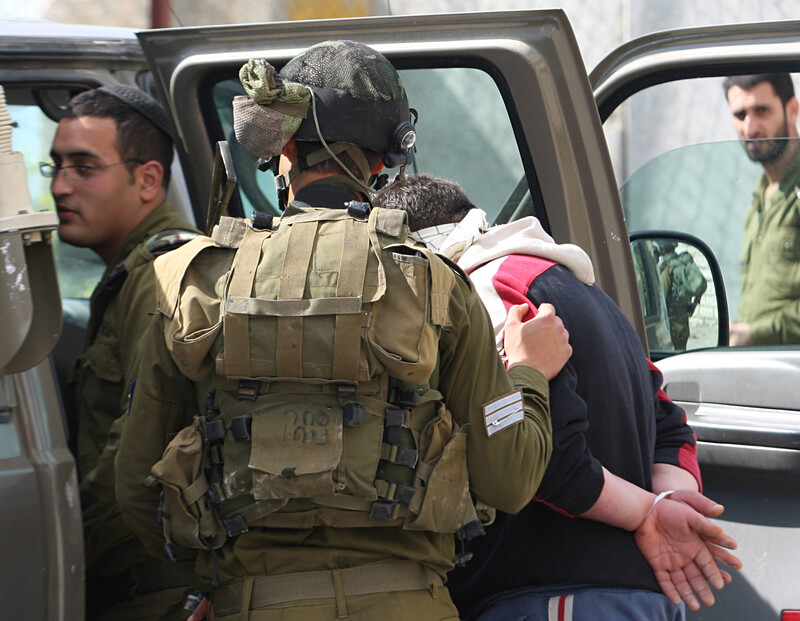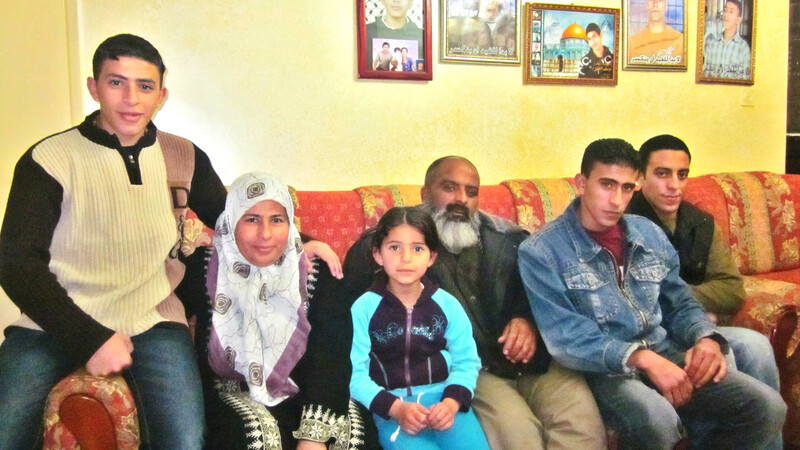The Electronic Intifada Beit Ommar 5 January 2012

Palestinian youth in Beit Ommar face regular repression, arrest and detention by Israeli soldiers during demonstrations against encroaching settlements and land confiscation.
MaanImagesThe streets of Beit Ommar are lined with posters of Palestinian boys and men, martyrs and prisoners of the Israeli occupation. One house is plastered with more posters than the others: the house of the Awad family, whose two sons were, until recently, being held in Ofer prison on the charge of throwing stones.
Mohammad Awad, 16, and his brother Ahmad, 19, were released from Ofer prison near Ramallah in the second phase of the prisoner swap deal in December. For Mohammad Awad, it is a particular relief to be free — his time in prison had an almost fatal effect on his health.
Awad has Familial Mediterranean Fever (FMF), a rare genetic disease which causes severe abdominal pain and chest and joint inflammation. “Sometimes I feel like my stomach is about to explode,” he told The Electronic Intifada. During his time in prison his condition was largely ignored, and the prison doctors seemed unable to deal effectively with his health problems.
Awad was sentenced to six months in Ofer prison after throwing a stone during a demonstration against Israeli settlements, but was released a month early as part of the prisoner swap deal.
According to Israeli human rights organization B’Tselem, 835 minors were prosecuted for throwing stones between 2005 and 2010. The act of throwing stones is punished harshly under Israeli military law and usually results in a penalty of three components: imprisonment, a conditional prison sentence, and a fine.
Mohammad’s father, Ali, and other family members said that Awad was severely beaten by the Israeli soldiers who arrested him, and his health deteriorated further after being medically neglected during his time in prison.
Medical negligence
“They gave me five types of drugs and medicine,” Awad explained. “The prison doctor gave them to me. They weren’t drugs for my illness, they were just painkillers to ease the pain. Some children have cancer and all that they give them is painkillers. I felt that they neglected me, and I was ignored as a patient.”
According to the United Nations’ Standard Minimum Rules for the Treatment of Prisoners, “[t]he medical officer shall have the care of the physical and mental health of the prisoners and should daily see all sick prisoners, all who complain of illness, and any prisoner to whom his attention is specially directed.” This international rule, however, was not applied to Awad.
Ahmad was in the same prison cell as his brother, and says the doctors were not attentive to Mohammad Awad’s needs. “Sometimes we would wake up and see him and he couldn’t talk, he couldn’t walk, he looked like he was dead,” Ahmad said.
“All the prisoners called for the officers, and asked them to save his life, give him some painkillers, anything. After many tries and many knocks on the door they came to take him to the doctor, and gave him some painkillers. That’s all they did.” Awad was eventually taken to Hadassah hospital in Jerusalem, where he was treated for his illness. “I believe if they had taken him to the hospital the first day he was ill, he wouldn’t get this worse condition,” said Awad’s father.
“He wouldn’t go [to hospital] unless he was dying. That’s the only reason they would send him. He was handcuffed and his legs were cuffed. He wasn’t taken as a patient, he was treated as a prisoner. They neglected him and ignored his condition, and that’s why he got so ill.”
Lack of proper care

Mohammed Awad (far left) and his family in Beit Ommar.
The Electronic IntifadaThe lack of proper medical care for Palestinian child prisoners in Israeli jails is a cause for concern for numerous human rights organizations. According to Addameer, a prisoner support and human rights group, medical negligence is a deliberate policy within the Israeli Prison Service (IPS).
“Part of the punishment is to ignore their medical needs,” said Mourad Jadallah, a former child prisoner who is now a legal researcher at Addameer. “The doctors don’t care. They just treat them as enemies. In Israeli prisons, they are not serious when they deal with health programs for Palestinian prisoners.”
“To date, approximately 51 Palestinian and Arab prisoners have died in Israeli prisons as a result of the IPS’s policy of deliberate medical negligence,” Addameer stated during 2011 (“Annual Report 2010,” Addameer [PDF]).
“Combined with harsh detention conditions that are conducive to different contagious, chronic and life-threatening diseases, the impact of this medical negligence can amount to physical and psychological torture.”
No sunlight
Ahmad and Mohammad Awad contend that the prison environment itself was detrimental to the health of the prisoners. “It’s not healthy at all,” Ahmad said. “There is no sun, we don’t see the sunlight. There is humidity and it is not clean, it’s very bad for patients, even for a normal person.”
According to their mother, Amina, the prison doctors had received Mohammed’s medical reports stating he has FMF. “We are assured that medical reports were received within the prison, but they neglected the reports and did not care about them, or about the medical condition of Mohammad,” she said.
“The problem with the detention of children is that treatment is always delayed,” said Amany Dayif of Physicians for Human Rights-Israel. “Doctors get the medical reports but don’t have the relevant medical reports in hand, and they don’t always know the accurate names of the illnesses.” The medical report issued upon Awad’s release, signed by Dr. Tsekhman of the Israel Prison Service, incorrectly states that he has thallasemia minor, a genetic blood disorder, rather than FMF.
One of the problems is that the standard for prison doctors is very low, therefore they are unable to provide a sufficient level of medical care. “The doctors in prison are not trained at all,” added Dayif. “They are not specialists of any kind. Sometimes they don’t even read English.
“If they weren’t employed by the prisons, they wouldn’t be employed by anyone else in Israel. They don’t know about many illnesses.”
Mohammad Awad’s family believes that he was misdiagnosed on purpose and given the wrong drugs deliberately as a form of punishment. “There was an Arab physician in prison with [Mohammad and Ahmad], and he saw the drugs. He advised them not to take them because they are very dangerous,” Awad’s father Ali said. “I accused the Israeli authorities that they were targeting him to make his health much worse.”
“It is possible that this is the case,” said Jadallah of Addameer. “Some of the doctors participate in the ill-treatment of prisoners.”
According to Physicians for Human Rights-Israel, however, the prison doctors are complicit in the ill-treatment of child prisoners through negligence rather than deliberate misdiagnosis. “I don’t believe they deliberately gave him the wrong medicine, they wouldn’t have the knowledge or the tools to do this,” said Dayif. “It’s more a case of neglect, which is a form of mistreatment, rather than deliberate mistreatment.”
“Doctors look aside when prisoners are being tortured or ill-treated,” Dayif explained. “They don’t hurt the prisoners, but they don’t report the ill-treatment. So they are part of it in some way.”
Mohammad and Ahmad Awad were also subjected to torture while in Ofer. Torture is defined by the UN as “any act by which severe pain or suffering, whether physical or mental, is intentionally inflicted on a person for such purposes as … punishing him for an act he or a third person has committed or is suspected of having committed.”
Torture as tool of occupation
The Awad brothers told The Electronic Intifada that they experienced and witnessed mistreatment — including sleep deprivation, vocal intimidation and taunts, beatings, being made to stand for long periods of time, as well as being attacked with dogs and tear gas. Addameer confirmed these are known practices within Israeli prisons.
“At Addameer, we believe that to arrest Palestinians is an Israeli tool of the occupation to destroy Palestinian society,” said Jadallah. “We don’t believe that arresting children is for the security of the area … but it’s a very good way for the Israelis to destroy Palestinian society, to destroy the Palestinian as a human being. The idea of prison is to turn Palestinians into passive people who accept the torture and accept the occupation.”
The maltreatment of Palestinian child prisoners becomes especially stark when contrasted with the treatment of Israelis, and particularly settlers, in the Israeli justice system. While Palestinians can be arrested by the army and are tried in military court, Israeli settlers from the same area are subject to civil law.
“There is no equality, no justice,” Nasri Sabarna, mayor of Beit Ommar, told The Electronic Intifada. “The settlers attack the houses, they attack the farmers in their fields. Sometimes they cut down the trees and burn the land. This is daily behavior … and they never get sent to jail.”
According to Addameer, every year approximately 700 Palestinian children under the age of 18 are prosecuted in the Israeli military courts after being arrested, detained and interrogated by the Israeli military.
According to the Palestinian Ministry for Detainee Affairs, more than 6,500 children have been arrested since 2000. The most common charge against these children is throwing stones, which is punishable in the military system by up to twenty years in prison.
The IPS, which is in charge of all prisons in Israel and the West Bank, claims to treat all prisoners with respect. The value statement on the IPS website claims that “IPS shall take all appropriate actions to protect the body and mind of every individual, guard, prisoner and citizen, out of recognition of their supreme importance.”
In reality, life for a child in prison tells a different story; one not of bodies and minds appropriately protected, but of bodies and minds deliberately neglected and mistreated.
Now back in Beit Ommar with his family, having regained his freedom, Mohammad Awad is starting to regain his health. “I feel so happy that all the family is together again,” he said.
“I feel like I am recovering and getting better. I feel much better now [that] I have seen my doctor.”
Emily Lawrence is a recent graduate and independent writer currently based in Bethlehem, West Bank. She can be reached at emilywarda AT gmail DOT com.





